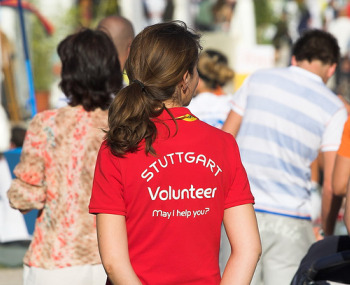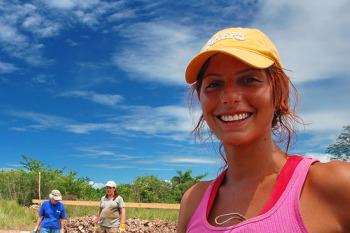When first presented, the concept of paying to do volunteer work frequently rubs people the wrong way. I was no exception. All through college I scooped poop, cleaned wounds and built enclosures (mostly held together by my own dried blood) as a 25+ hour per week volunteer. The only costs to me were those of the occasional rabies shot and tetanus booster, or so I thought. Later, as a ‘real’ wildlife keeper, foolish people paid me money to do what I loved. Given that lofty accomplishment, how could anyone now ask me to give up both my vacation time and my money to contribute such fabulously honed talents? The audacity!
Time changes all things, especially perspective and attitude. Recently I read a blog comment from a young man proclaiming, “Sorry to say it, but all projects where you pay money to volunteer are a scam.” His ignorance rubbed me the wrong way. By scratching just below the surface a case for paid voluntourism can easily be made. Consider the following points, only then will you have the tools necessary to make an educated decision as to whether or not paid volunteer travel opportunities are right for you.
First recognize that you are not paying to work. Responsible volunteer travel providers “provide”. Go figure. They supply services to you and should also benefit the projects you work on. To varying degrees, often dependent on cost, you as the traveler can expect any of the following services.
- Assistance with making travel arrangements
- Airport pick-up, transfers and other logistics taken care of for you
- Side trips, escorts, translators and other assistance acclimating you to the region where you are volunteering
- Prearranged accommodations and meals may be provided
- Emergency assistance
- An onsite representative familiar with the work, the country and how to resolve issues that may arise
- Defined expectations
 In other words you are freed up to share your skills, learn from the project hosts and experience the culture without sweating the innumerable logistical hassles of self-travel. Will problems still arise from time to time? Sure! Such things are a part of travel. Nonetheless, fewer hassles and a good safety net are never a bad thing to have. In addition the best philanthropic travel providers also benefit the non-governmental organizations (NGOs), nonprofits, research teams, projects, etc. which they work with by ‘providing’ them help in many of the following ways:
In other words you are freed up to share your skills, learn from the project hosts and experience the culture without sweating the innumerable logistical hassles of self-travel. Will problems still arise from time to time? Sure! Such things are a part of travel. Nonetheless, fewer hassles and a good safety net are never a bad thing to have. In addition the best philanthropic travel providers also benefit the non-governmental organizations (NGOs), nonprofits, research teams, projects, etc. which they work with by ‘providing’ them help in many of the following ways:
- Providers can locate (provide) qualified, prescreened/pre-trained assistance to charities and causes without the recipient of the volunteers having to administer their own volunteer recruitment program.
- An intermediary is available to deal with volunteer emergencies and problematic volunteers. (Yes, they do exist.)
- Not all charities are prepared to deal with the housing, feeding, transport and other logistical issues that come with having a formal volunteer program. Yet, they desperately need more helping hands. Intermediaries, such as voluntourism operators bridge this gap.
- Frequently organizations providing volunteers also make monetary contributions, donate supplies and assist the programs in other ways. Always ask a potential provider the exact ways they contribute to the programs they represent and/or the communities they work within. If they don’t contribute to the project, don’t walk away – run!
These are just a few illustrations of how both travelers and charitable operations benefit from the use of a good volunteer travel coordinator program. Paying to volunteer does not seem quite as bad when you look at the realities of what providers can do. And don’t forget they have their own administrative costs to cover, including:
- Paying salaries of staff (I’d much rather help support jobs for someone who coordinates trips to help orphanages than to see all my money support some Wall Street banker’s Christmas bonus)
- Locating and inspecting responsible projects for volunteers, often all over the world, and weeding out those that may indeed be scams themselves.
- Advertising/recruiting/screening volunteers and providing them with pre-trip assistance, training and information. Good marketing takes money and a unique skill set small third world charities don’t always have the resources to perfect.
- Websites, and taxes, and office equipment – oh my!
 As you see good quality organizations connecting people to projects desperately needing volunteers provide legitimate services. Often they do so at a minimum of expense and can be an invaluable tool in making sure your travel experience is both positive and productive.
As you see good quality organizations connecting people to projects desperately needing volunteers provide legitimate services. Often they do so at a minimum of expense and can be an invaluable tool in making sure your travel experience is both positive and productive.
Keep in mind volunteering is like a short marriage. One way or another you pay. Should you choose to go it alone, washing up on some distant shore looking for a volunteer project – that approach works for some types of travelers. Everyone has their own voluntary style. I confess, I’ve taken this approach many times. However, it was not free! I still needed accommodations. I still had to find places to eat and to tackle the challenges of foreign transportation and cultural acclimation. Many lessons were learned the hard (and often expensive) way. Nonetheless, that was my personal voluntary style at the time.
For the most part, it still is my approach when volunteering is just one facet of a more extensive journey. Yet, as I get a little bit older, I find no shame in wanting to focus purely on the projects which I long to volunteer with; concentrating specifically on the animals, the children, the primary work at hand. Leaving lesser arrangements to someone else from time to time can be a blessing. I suspect this new forming love of singular focus and ease will grow with the passing years. In fact, the very thought of approaching a project with a poop-scoop in one hand and no worries in the other makes me grin just a little bit bigger as I contemplate my next volunteer adventure.
Photos by dheuer, Dave Bezaire & Susi Havens-Bezaire’s